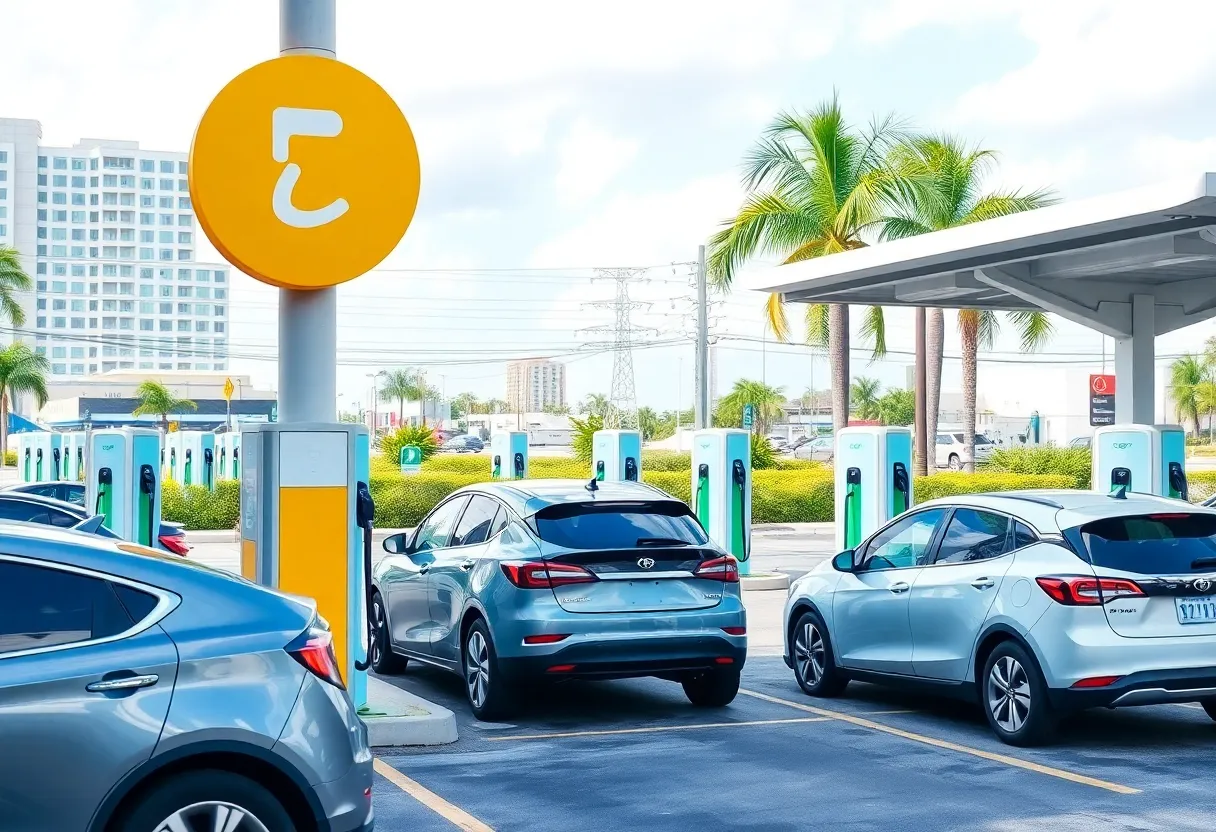News Summary
Florida is set to see major growth in its electric vehicle (EV) infrastructure, with a new large charging depot planned in South Florida. Local leaders are advocating for legislative measures to address declining gas tax revenues, which have traditionally funded road projects. As EV adoption rises, creative solutions are needed to sustain transportation funding. Meanwhile, Palm Beach State College is launching training programs for EV mechanics to meet workforce demands. Legislative proposals for EV-related fees are also being discussed to mitigate revenue losses.
Florida is witnessing a significant expansion in its electric vehicle (EV) infrastructure, as a major company plans to build one of the largest charging depots to date in South Florida. This surge in electric vehicle adoption has prompted local leaders to request legislative action to address the funding shortfalls caused by a decline in gas tax revenue, traditionally used for road construction and maintenance.
Westlake Mayor JohnPaul O’Connor has reached out to the Palm Beach County Legislative Delegation to advocate for a new state bill aimed at establishing alternative funding strategies for transportation. With electric vehicles avoiding the gas tax, there is increasing concern over sustainable funding for crucial infrastructure projects. Florida’s current gas tax is 38.6 cents per gallon, placing it as the 12th highest in the nation, but as more drivers switch to electric, this revenue stream is diminishing.
As fuel efficiency improves and electric vehicles rise in popularity, experts indicate that the effectiveness of the gas tax is declining. According to the Tax Foundation, states have begun to implement higher annual registration fees for electric vehicles as a means to compensate for this loss. Currently, Florida does not impose these fees, while states like Hawaii and South Dakota charge $50 annually, and others such as Ohio and West Virginia levy charges of $200.
Anticipated Declines in Tax Revenue
Broward County is projected to collect $81.7 million from gas tax revenue this year, which is down $800,000 from the previous year. The decline can be attributed to multiple factors, including increased use of public transit, telecommuting, carpooling, and rising electric vehicle adoption. In a similar vein, Palm Beach County estimates local gas tax revenue to be $54 million, dedicating $20 million for road and bridge maintenance and $34 million for public transit services. These figures indicate a stark contrast to 2005, when Broward County received $91.2 million from gas taxes.
Future Legislative Strategies
Mayor O’Connor has underscored the need for “creative legislation” to effectively tackle funding losses stemming from the growing EV market. In response, State Sen. Gayle Harrell emphasized the importance of a national approach to ensure adequate funding for interstate travel as electric vehicle usage escalates. In response to the legislative challenges, State Rep. Kelly Skidmore has proposed a registration fee and a charging station fee specifically for electric vehicles in Florida. However, past attempts to introduce additional fees for electric and plug-in hybrid vehicles were met with resistance over concerns of potential double taxation.
Future projections warn that revenues from motor-fuel taxes could decrease by as much as 5.6% to 20% by 2040 due to the rising popularity of electric vehicles, signaling an urgent need for legislative action to secure adequate funding streams.
Workforce Development in Electric Vehicle Mechanics
In conjunction with this infrastructure growth, Palm Beach State College is set to launch training programs for electric vehicle mechanics in 2026, supported by over $4.1 million in federal funding. This new facility will include 12,000 square feet dedicated to both classroom instruction and practical mechanic bays, made possible through the demolition of an existing dental school building. Early career salaries for electric vehicle mechanics range from $25 to $30 per hour, which is notably higher than the $15 to $25 typical for standard mechanics. Interest in auto courses at Palm Beach State College has surged, exceeding enrollment capacity, highlighting a robust demand for skilled workers in this burgeoning field.
Additionally, Miami-Dade Fire Rescue is preparing to tackle new challenges arising from the introduction of 100 battery-electric buses in their transit operations. These vehicles necessitate advanced construction and safety measures due to their unique fire hazards, as electric vehicle fires burn hotter and require significantly more water to extinguish compared to conventional vehicle fires.
As Florida’s electric vehicle market continues to grow, the push for legislative action to reform transportation funding strategies, alongside workforce development initiatives, indicates a proactive approach to navigating these changes effectively.
Deeper Dive: News & Info About This Topic
- Miami Herald: Florida Climate Change and EV Infrastructure
- Google Search: Florida electric vehicle
- WPBF: Florida Electric Hybrid Cars and Charging Stations
- Wikipedia: Electric vehicle
- Sun Sentinel: Electric Car Owners and Gas Tax
- Encyclopedia Britannica: Electric vehicle
- NBC Miami: Fire at Miami Electric Vehicle Shop
- Google News: Miami electric vehicle fire
- Palm Beach Post: Electric Vehicle Training Center in South Florida
- Google Scholar: Electric vehicle infrastructure Florida

Author: STAFF HERE ORLANDO WRITER
ORLANDO STAFF WRITER The ORLANDO STAFF WRITER represents the experienced team at HEREOrlando.com, your go-to source for actionable local news and information in Orlando, Orange County, and beyond. Specializing in "news you can use," we cover essential topics like product reviews for personal and business needs, local business directories, politics, real estate trends, neighborhood insights, and state news affecting the area—with deep expertise drawn from years of dedicated reporting and strong community input, including local press releases and business updates. We deliver top reporting on high-value events such as Orlando International Fringe Theatre Festival, Megacon Orlando, and Central Florida Fair. Our coverage extends to key organizations like the Orlando Economic Partnership and Hispanic Chamber of Commerce Metro Orlando, plus leading businesses in leisure and hospitality that power the local economy such as Walt Disney World Resort, AdventHealth, and Universal Orlando. As part of the broader HERE network, including HEREJacksonville.com, HEREPetersburg.com, HERETallahassee.com, and HERETampa.com, we provide comprehensive, credible insights into Florida's dynamic landscape.




